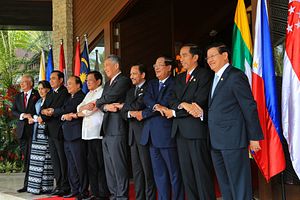The Association of Southeast Asian Nations (ASEAN) wrapped up its annual summit in the Philippines on April 29. The regional bloc comprises 10 nations: Brunei Darussalam, Cambodia, Indonesia, Laos, Malaysia, Myanmar, the Philippines, Singapore, Thailand, and Vietnam.
ASEAN loyalties have been tested in recent years with the active encroachment of China in the South China Sea under the guise of its own nine-dash line maritime claim, despite the singing of a non-binding Declaration of Conduct in the South China Sea in 2002 to discourage any hostile acts between ASEAN and China. All 12 nations agreed not to use threats or force to assert any territorial claims; however, China has built artificial islands in disputed areas, including several installations with potential military uses in the Spratly Islands.
In 2013 the Philippines sought clarification from the an arbitral tribunal as to whether China’s nine-dash line could negate the Philippines’ Exclusive Economic Zone (EEZ) as guaranteed under the United Nations Convention on the Law of the Sea (UNCLOS), of which China is a signatory. In 2016, the Permanent Court of Arbitration tribunal concluded that China had no historic claim to resources to the sea areas falling within the nine-dash line.
However, at the ASEAN Summit, Philippine President Rodrigo Duterte, the sitting chairman of ASEAN, said any discussion about the fortification of reclaimed islands in the South China Sea by China was useless, and that he did not seek any “trouble” with China. According to Duterte, the South China Seas issue was never raised during his discussions with the other ASEAN leaders, except for the prospect of a Code of Conduct to be released “at the very least by the end of this year.” The formulation of the code has been ongoing since 2010.
But some ASEAN parties doubt China’s sincerity toward the CoC. China refused to make binding the existing 2002 Declaration of Conduct in the South China Sea. ASEAN secretary general and Vietnamese politician Le Luong Minh told Reuters the code needed to be legally binding to put a stop to “unilateral actions,” because a previous commitment to play fair had been ignored.
Speaking to the South China Morning Post, Indonesian President Joko “Jokowi” Widodo has proposed that states involved in the South China Sea disputes should engage in “concrete cooperation” before any code of conduct is developed.
Indonesia does not have any active, competing territorial claims with China over any part of the South China Sea, but the Indonesian archipelago does lay claim to EEZs in the resource-rich waters around its islands, and Asia’s third most populous nation has not hesitated to exercise its claims. Indonesia has often responded to incursions with the use of force. Indonesian navy patrol boats have fired upon encroaching Chinese fishing vessels and seized vessels have been sunk. Indonesia has also made plans to deploy extra warships, fighter jets, and surface-to-air missiles into the affected regions.
Knowing China’s preference for bilateral agreements with individual countries, Jokowi says that ASEAN needs to come to a common agreement internally before it can negotiate with China. One of the key issues preventing such unity has been the competing interests of member states, with the likes of Cambodia and Laos (neither of which border the South China Sea) often vetoing any directives that would be detrimental to China’s interests.
“I think we need to have a common stand. The most important is that ASEAN internally needs to have a mutual agreement on this issue,” said Jokowi in an interview with the South China Morning Post. “Then and only then can we communicate with China.”

































